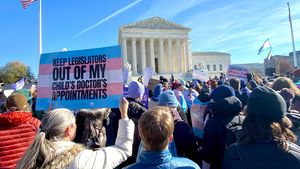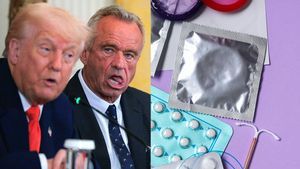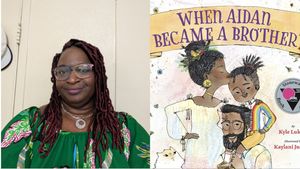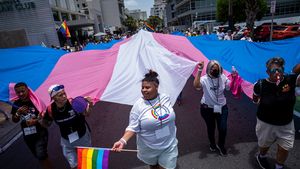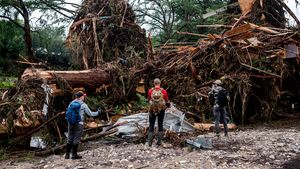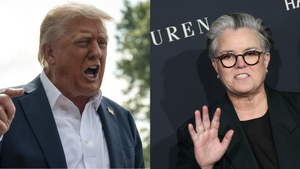T Cooper makes his feature directorial debut with Man Made, one of several documentaries about trans lives currently on offer at Outfest, the country's leading LGBT film festival. Cooper previously worked as a journalist, novelist, and TV writer (notably on Netflix's The Get-Down) but made the leap to documentary to look closely at the personal journeys of five trans men who participate in the world of competitive bodybuilding. (Cooper himself is one of a handful of trans filmmakers whose work has been embraced by Outfest.) A devastating and ultimately triumphant film about a diverse variety of trans experiences, Man Made is the rare crowdpleaser with genuine cultural value, and the largest muscle on display is the film's enormous heart. Director T Cooper spoke with OUT.com about his journey to documentary filmmaking, the queer festival circuit, and, of course, Scarlett Johansson.
Related | 15 Outfest 2018 Features We're Excited About
Austin Dale: This is your first feature doc, but you've worked in narrative storytelling before as a journalist and fiction writer. What was your journey to documentary filmmaking?
T Cooper: I was always a novelist and a print writer. My first inclination when I found out about this world of trans bodybuilders was to write a two-dimensional story in print about it. You know how it is: You pitch to some people you work with about it. But when I started to do the research and talk to these guys, I was like, Oh, this actually feels like it needs to be a much more three dimensional story. I'd been writing novels and books for so long but as you know the market has changed so much and my adaptation to TV writing was a very natural one. I've always been interested in non-fiction stories as well. It has everything, all the elements that are attractive to me. And as you know, as a concept it is very visually stimulating. The subject matter spoke to me and said it needed to be a film, a long film, a feature. I raised money along the way, hooked up with a producing partner who gave me actual equipment, and I applied to a ton of grants. I got really lucky with Sundance, who gave me two grants. The storytelling part of this- turning this into a script - all made sense. The stuff I've been in a crash-course on is the rest of it: Producing, going to film festivals, raising money.
AD: Was there a specific moment when it stopped being a magazine piece and became something you felt people needed to actually be looking at?
TC: Yeah. It was the diversity of transmasculine experience in the community that was attracted to this competition. When you look at cis bodybuilding competitions, the versions of masculinity are all very similar, even across race and size. There's a version of this hyper-Adonis, Arnold-looking masculinity that was so pervasive, even in the so-called natural bodybuilding. What was so mindblowing to me was how everybody, and literally every body, was celebrated and welcome to show off wherever their bodies were in this journey. That notion of meeting people where they are is a universal value that I hope we can all aspire to. It was so great that you could be on testosterone or not be on testosterone, to have had surgery or not have had surgery. They were just all over the spectrum. And that's not to say that it wasn't competitive. It was highly competitive. It's not one of those things where everyone gets an award for showing up. A lot of guys needed to represent this story.
Specifically when I started talking to guys like Rese, who is a trans man with a kid at home. And then Dom, who was going to be competing in one competition with breast tissue, go back and have surgery and then compete in the next competition. These are really big journeys and going in and out wouldn't be doing justice to them. Things like finding out that Dom had just located his biological mother on Facebook. That's a whole other facet of identity that has nothing to do with being trans. This stuff was all so important to watch, not only what got these guys to the moment where they were competiting on stage.

AD:You're talking about these important moments in people's lives. They had to be very vulnerable with you. I was curious watching the film about how you got to know your five subjects generally, and what your process was like for getting them comfortable on camera. That felt to me like a lot of the labor of the project, because it's so intimate.
TC: A lot of it comes naturally to me as a journalist. I'm very curious, but I also listen. When folks feel safe and heard, they do get more comfortable and more open to sharing. Literally every guy said at one point, "There is no way I would do this if you weren't trans as well." There was an intimacy and a brotherhood that was organic without me having to do anything. They heard the intention behind my questions and they heard the intention behind me trying to be there for things. It didn't feel predatory or exploitative because I wouldn't tell these stories any differently from how I would tell my own. We are so careful about how we construct our own stories. These feel like five versions of my life story even though I'm not a bodybuilder.
AD: This is your first time at Outfest with a film.
TC: Yeah. My first film was an animated short, and it wasn't really queer, so we did other festivals like Tribeca and SXSW. This is really my first time on the queer film festival circuit.
AD: Knowing the crowd, I think it's going to do great. Is there anything specific you want people to go into the movie with or get out the film?
TC: I think what's really lovely is for people to have the opportunity to engage with the film, and me, and the subjects. Two will be at the screening, Mason and Kenny. And also you going to see rich and diverse trans lives on screen. Trans male lives don't really exist in culture. If they do, they're a throwaway line, or they're a joke, or a guy dropping his dildo on the bathroom floor.
AD: Or they're Scarlett Johansson.
TC: Yes, like we're playing a role. Like we're not really men, or we're just women pretending to be men. It's so misguided, unfortunately. [Editor's note: Actress Scarlett Johansson was recently cast as transgender man in the indie drama Rub & Tug. Johansson has since left the role in response to widespread criticism.] Trans lives are so little understood and it's great to actually get to have trans material celebrated at Outfest. There's a lot of other trans content at Outfest that isn't necessarily made by trans people, so what you get here is a super intimate, authentic trans male experience. I personally have never seen my story out there. I just don't see my life anywhere. And in this I feel like I see five versions of it in this film. It's really nice to let us tell our stories and I'm really psyched that Outfest believes that too. They're giving us not one but two screenings. Advance screenings sold out for the first one! It's so nice to see people's hearts open up after they see the film. I feel like I've learned something every time we've shown it.



























